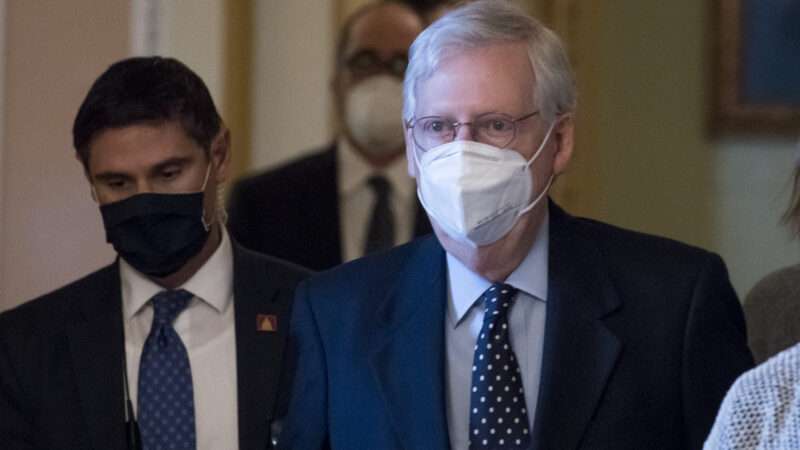
Senate Majority Leader Mitch McConnell (R–Ky.) today acquiesced to demands from President Donald Trump, a majority of congressional Democrats, and some congressional Republicans to greenlight a bill giving $2,000 COVID-19 relief checks to Americans under a designated income threshold. But there’s a catch: McConnell’s legislation would also eliminate Section 230 of the Communications Decency Act.
JUST IN: McConnell introduces bill that offers $2000 direct-payments, repeals section 230 (immunity for social media companies), and commissions an election fraud study.
— Sean Langille (@SeanLangille) December 29, 2020
Section 230 essentially functions as the internet’s First Amendment, by protecting private companies from being held liable for most forms of user-generated content. This is the second time in very recent history that lawmakers have sought to sneak Section 230 changes into legislation that otherwise has nothing to do with Section 230.
Earlier this month, Trump vetoed the National Defense Authorization Act (NDAA) because it contained was no clause repealing Section 230. Sen. Roger Wicker (R–Miss.) reportedly tried to achieve Trump’s aim by inserting such language into the legislation; the effort failed, and yesterday Congress overrode Trump’s veto.
Section 230 has attracted bipartisan enmity, although for completely different reasons: Republican critics say that online giants such as Facebook and Twitter are too heavy-handed with content moderation, at least when it comes to conservative speech, while their Democratic counterparts want platforms to scrub more hate speech, fake news, etc. 230’s critics range from Sen. Josh Hawley (R–Mo.) to Vice President-Elect Kamala Harris, though one wonders if either one would be happy with the result of the rollback once the other party was in power.
McConnell’s bill would also create a committee to investigate election fraud and the impact of COVID-19 on voting practices, as Trump keeps pushing the conspiracy theory that President-elect Joe Biden stole the 2020 election.
Trump initially threatened to veto the recent omnibus spending bill if Congress failed to include the $2,000 individual relief checks—which are currently capped at $600—and eliminate some of the miscellaneous wasteful measures. (The Smithsonian, for instance, will receive $1 billion for two new museums.) Not one of those demands was met, but he signed the legislation regardless. McConnell may think today’s bill gives him the best of both worlds: He addresses Trump’s demands while sinking any hope of actually passing it.
The House of Representatives yesterday approved a separate bill to increase the $600 payments to $2,000. Only two Democrats voted against that, and a handful of Republicans voted in favor.
Several Senate Republicans also support the idea, including Hawley and the two Georgia Republicans up for reelection: Sen. David Perdue (R–Ga.) and Sen. Kelly Loeffler (R–Ga.).
President @realdonaldtrump is right — I support this push for $2,000 in direct relief for the American people. https://t.co/Al3USM7zPr
— David Perdue (@Perduesenate) December 29, 2020
I agree with @realDonaldTrump — we need to deliver $2,000 direct relief checks to the American people.
— Kelly Loeffler (@KLoeffler) December 29, 2020
Both Perdue and Loeffler have positioned themselves as stalwarts of free markets, with Perdue claiming on Fox News that they are “the last line of defense” against socialism in Congress. It’s highly doubtful that either Georgia senator would support such a proposal had it not come from Trump. On the other hand, it’s hard to explain why someone would vote yes on the $2.3 trillion omnibus bill—whose 5,593 pages were decorated with special handouts—and say no to direct assistance for the American people.
from Latest – Reason.com https://ift.tt/37ZjAqm
via IFTTT